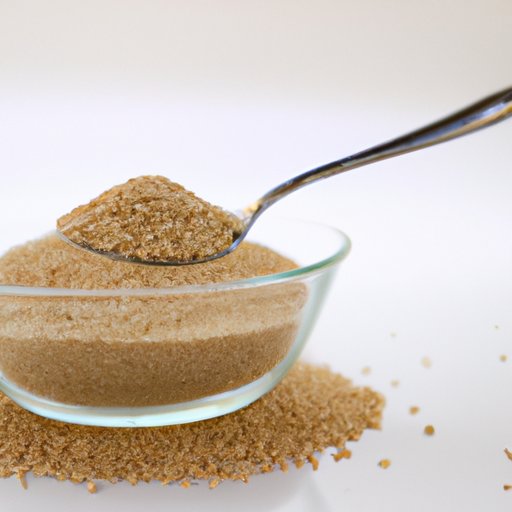
Introduction
Living with gluten sensitivity can be challenging. Avoiding foods and ingredients that contain gluten, such as wheat, rye, and barley, can have a significant impact on your daily life. Barley malt extract is an ingredient that is often used in various food products and is a common sweetener in baking and cooking. But is it safe for those with gluten sensitivity? In this article, we will explore the use of barley malt extract in gluten-free diets, including its safety, nutritional value, and potential benefits.
Is Barley Malt Extract Safe for Those with Gluten Sensitivity?
Gluten sensitivity is a condition that occurs when the body reacts negatively to gluten protein found in wheat, rye, and barley. The immune system mistakenly attacks the lining of the small intestine, causing damage and inflammation, leading to a range of symptoms such as bloating, diarrhea, and fatigue.
Barley malt extract is derived from barley, which contains gluten. As a result, it might be assumed that barley malt extract contains gluten, making it unsafe for those with gluten sensitivity. However, the process of extracting malt from barley involves removing the gluten proteins, meaning that the resulting product should technically be gluten-free.
A study conducted by the Gluten Intolerance Group found that some barley malt extract products contained less than 20 ppm of gluten, which is the maximum threshold considered safe for those with gluten sensitivity. However, other studies have reported higher levels of gluten in barley malt extract products, making it difficult to determine if barley malt extract is truly gluten-free.
Gluten-Free Cooking with Barley Malt Extract
Despite the controversy surrounding the safety of barley malt extract in gluten-free diets, many people still use it as a sweetener in baking and cooking. Using barley malt extract in gluten-free cooking can add flavor and improve the texture of baked goods. It can be used in place of sugar and other sweeteners, offering a unique taste to recipes.
Some of the recipes that use barley malt extract include granola bars, bread, and cookies. Barley malt extract can also enhance the flavor of savory dishes, such as glazes for meats and sauces for vegetables.
Using barley malt extract in gluten-free cooking has its benefits. For instance, barley malt extract is high in antioxidants and contains vitamins and minerals that are essential for maintaining good health. It is also lower in calories than other sweeteners, making it a good alternative for those looking to maintain a healthy weight.
The Controversy of Barley Malt Extract in Gluten-Free Diets
Barley malt extract is often avoided in gluten-free diets due to uncertainty about its gluten content. Although some barley malt extract products qualify under the current standards for gluten-free, some experts in the field advise against its use due to the risk of potential contamination and the lack of clarity about its gluten content.
For those who are ultra-sensitive to gluten, it is best to avoid consuming barley malt extract and any products that contain it altogether. However, for those with less severe gluten sensitivity, consuming products that contain barley malt extract may not cause any adverse symptoms.
Barley Malt Extract vs. Other Sweeteners: How Does It Stack Up?
Barley malt extract has several nutritional advantages compared to other sweeteners, such as sugar, honey, and maple syrup. Barley malt extract contains fewer calories than most traditional sweeteners and has a lower glycemic index, meaning that it causes less of a spike in blood sugar levels. In addition, it contains essential vitamins and minerals like iron, zinc, and magnesium that are beneficial for overall health.
Compared to artificial sweeteners, barley malt extract is a safer alternative, as it does not contain any chemicals or preservatives. It is a natural, nutrient-dense sweetener that can provide an interesting flavor profile to various recipes.
Top 5 Gluten-Free Beers Made with Barley Malt Extract
Beer lovers with gluten sensitivity can still enjoy their favorite drink thanks to gluten-free beers made with barley malt extract. Gluten-free beer is brewed with alternative grains like sorghum, rice, and corn instead of barley and wheat.
Some of the top gluten-free beers made with barley malt extract include Dogfish Head T’weason’ale, Green’s Tripel Blonde Ale, Lakefront New Grist, Harvester Brewing Gluten-Free IPA, and O’Brien’s Gluten-Free Pale Ale. These beers are made with gluten-free ingredients, such as sorghum, brown rice, and millet, making them safe for those with gluten sensitivity.
Barley Malt Extract: A Gluten-Free Alternative to Traditional Sweeteners
Barley malt extract can be used in a variety of ways as a substitute for traditional sweeteners. It can be used in place of sugar, honey, and maple syrup. Additionally, it can be used to enhance the flavor of savory dishes.
Using barley malt extract in baking and cooking can provide a unique, malty flavor to recipes. It can be incorporated into granola bars, bread, cookies, and other baked goods to improve the taste and texture. Barley malt extract also adds flavor to sauces and marinades for meats, fish, and vegetables.
Conclusion
In conclusion, the safety of barley malt extract in gluten-free diets remains a controversial topic among experts in the field. While some studies suggest that barley malt extract is safe for those with gluten sensitivity, others advise caution due to the potential risk of contamination. However, barley malt extract has several nutritional benefits and can be an excellent alternative to other traditional sweeteners.
For those with less severe gluten sensitivity, incorporating barley malt extract into their diet can add flavor and nutritional value to their meals. It can be used in baking and cooking, as well as in brewing gluten-free beer. Overall, if you are curious about using barley malt extract, it is worthwhile discussing it with your healthcare provider and testing it out to see how your body reacts.




